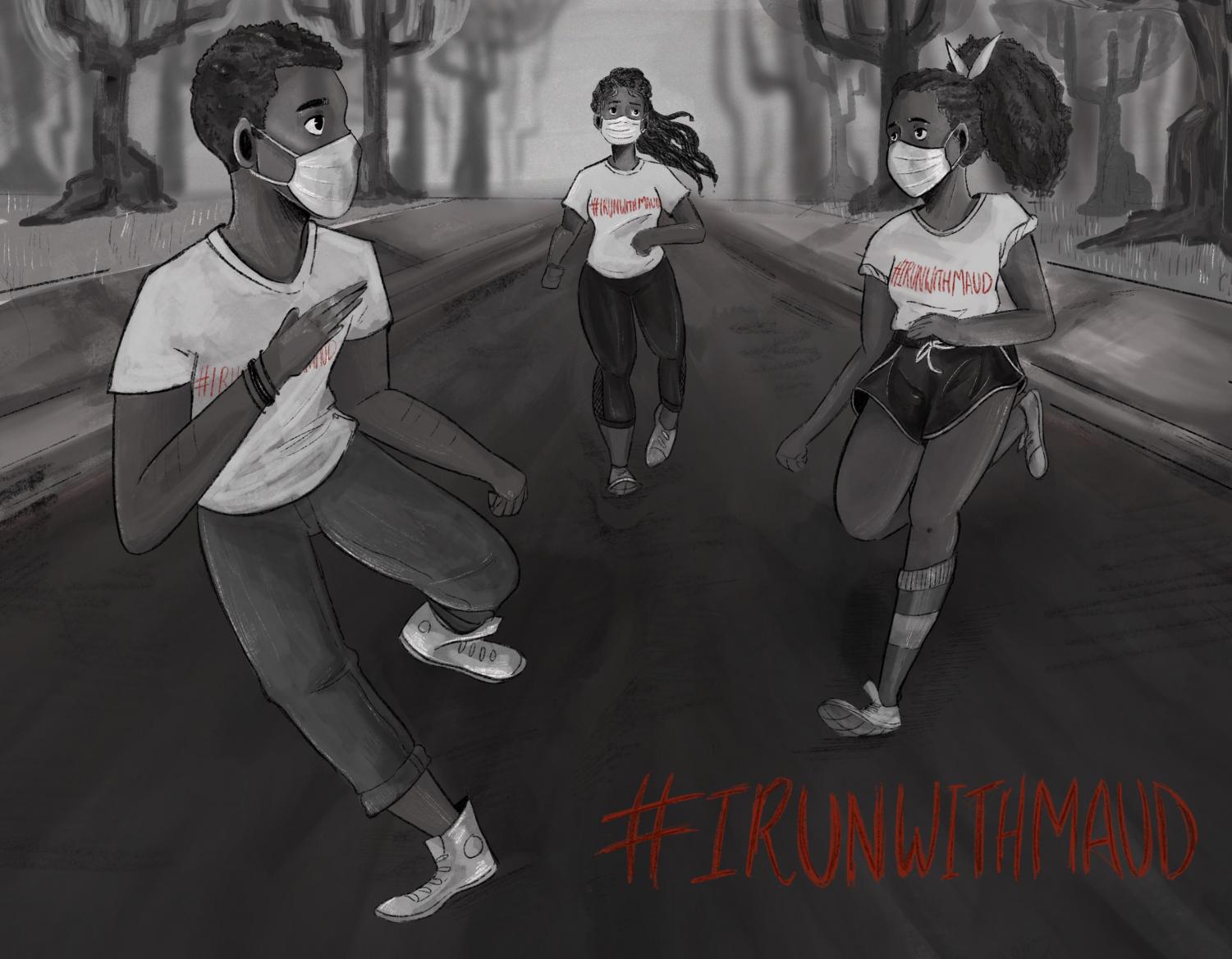(Race)ism: The Rippling Effect of Ahmaud Arbery on the Community
May 23, 2020
The Afternoon of February 23
On Sunday, Feb. 23, Ahmaud Arbery, an unarmed African-American man, was jogging in a suburban neighborhood in South Georgia when he was approached by a pickup truck with Gregory McMichael behind the wheel and his son, Travis McMichael in the passenger seat. The altercation ended when Travis fatally shot Arbery, leaving him on the side of the road to bleed to death. According to an autopsy report, Arbery was shot three times.
Since Gregory McMichael had just recently retired in 2019 after spending many years as a police officer and investigator in the district attorney’s office, the first two local prosecutors recused themselves from the investigation due to their connection to McMichael. Therefore, neither of the McMichaels were arrested. After being questioned and interviewed by the police, Gregory claimed that Arbery resembled a man suspected of multiple burglaries in the area. However, it was reported that there had not been any break-ins in the neighborhood.
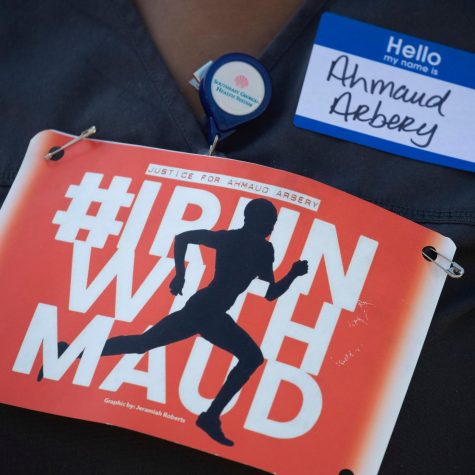
As time progressed and the pandemic began to receive all of the attention on the news, Arbery’s family and friends—although limited due to the coronavirus restrictions— continued to protest the brutal killing of Ahmaud. At this point, the news of the killing was confined to the city of Brunswick.
On May 5, however, everything changed. A video of the incident, filmed by William “Roddie” Bryan, was released by a Brunswick radio station. It was not long until the video went viral as it was uploaded to popular internet platforms such as Youtube and Twitter. On May 7, Gregory and Travis McMichael were arrested 74 days after fatally shooting Arbery. They were charged with murder and aggravated assault.
In order to honor the life of Ahmaud Arbery and continue to bring attention to his killing, people all across the country began using the hashtag #IRunWithMaud. Additionally, people committed to running or walking 2.23 miles since he would have turned 26 on Friday, May 8. The 2.23 mile distance symbolizes the date he was fatally shot.
Members of the Black Student Union at Sage Creek quickly rallied to support Ahmaud and his family by participating in the run as well as sharing their experiences with racism in America.
In Memory of Ahmaud Arbery
Ahmaud Arbery was a great runner—a passionate runner in fact. According to his former high school football coach Jason Vaughn, Arbery ran all of the time, rain or shine. However, running shouldn’t be the only thing that Arbery is remembered for.
Born on May 8, 1994, he would’ve turned 26 last Friday. Back in high school, Arbery “carried himself with effortless charm,” close friend Akeem Baker reminisces. He remembers Arbery as a kind person who would laugh at his impressions on the morning bus rides to school, and delineates the moments where they would play a football game referred to as “hot ball” together: unforgettable times with a person who was always such a pleasure to be around. Both Baker and Arbery served as linebackers for the Brunswick High School Pirates; Arbery was such an impressive football player that Baker explains he had even dreamed of playing for the NFL one day.
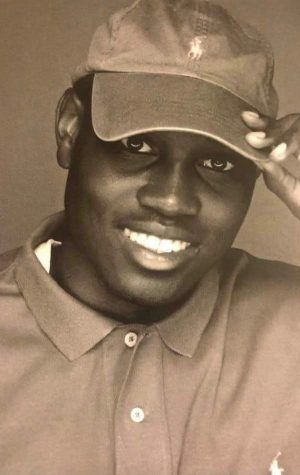
Arbery was not only a great football player, but he was also an amazing friend. Following high school, Baker and Arbery stayed in touch, reconnecting every so often over a phone call in which they discussed their current experiences. Baker recalls the time where he called Arbery about the chemistry class that he was struggling with because he knew that he could rely on him for advice. “When situations get hard, you’ve just got to get hard with it. In the end, you don’t just go through it. You grow through it,” Arbery accentuated to Baker over the phone call. He was a man who prioritized supporting his friends and he encouraged their success and growth through his prominent optimistic attitude. Working at McDonald’s while Baker planned to attend college, Arbery didn’t feel any less satisfied with his lifestyle. Nevertheless, he promoted Baker’s aspirations, assuring him that he was going to “see [him] at the top.” He made everyone around him feel welcome and confident, always striving to be the best person he could be, rubbing off his positivity on everyone around him.
Shortly after high school, Arbery went to attend South Georgia Technical College to become an electrician, but ended up moving back to Brunswick. According to Baker, Arbery took on the occupation of doing landscaping work alongside his father, in addition to his other job working at a truck wash prior to the incident.
The passing away of Arbery has left his mother, father, grandmother and two older siblings along with his other family members, friends and community devastated by the loss of a truly amazing man in their lives.
“Ahmaud was humble. To know Ahmaud is to love Ahmaud. Ahmaud didn’t deserve to go the way he went,” states his mother, Wanda Cooper-Jones.
Intolerance Runs Deep
After the Ahmaud Arbery shooting, several students have had reflections on their personal accounts of racism. Three African American students of Sage Creek share their personal anecdotes and reactions following the shooting of Arbery and the media that surrounded it. The students share powerful stories and quotes that line their daily lives and how they battle the trauma.
Brooklyn Branson
A 9-year-old girl goes for a morning drive with her family in her hometown in Texas. It’s a loving family outing until the car rolls to a stop in compliance with the red light. The area they are in is rather conservative; being an interracial family is no surprise to them, yet it seems to shock other residents. They hear the screech of brakes as the truck next to them comes to a stop. A red light is not something a child should stress about, yet Brooklyn Branson’s eyes widen as she sees the Confederate flag waving high from the truck’s bed.
The light flashes green and the truck driver glances at the Bransons with no care in the world. Yet, this exact moment will be something that Branson remembers for the rest of her life. The stretch of road following the light spans a vast bridge. As the cars pick up speed, the truck seems to be drifting into Branson’s lane. When this happens in most cases, a honk will educate the driver on their accidental lane change, but the Bransons know this is no accident. The truck comes closer and closer to the Bransons and starts to push their car. It becomes very clear to Brooklyn that the truck is trying to push their car off the bridge. Push their family off the bridge. Just because of the color of their skin.
Brooklyn, who is now a sophomore at Sage Creek, deals with racism on a common basis and even feels uncomfortable attending school. She feels isolated being the only African American student in her class every day. She faces racism every single day but has grown from her experiences and encouragement from her progressive family. Her mother has received backlash from her choice in marriage and was treated differently just because her husband was black. When Brooklyn first heard about the Arbery shooting, her father was the one who broke the horrifying news. They both were very emotional but Brooklyn soon realized the big picture.
“If it wasn’t Ahmaud, it was just gonna be another black man… It could’ve been my father,” stated Branson.
Christian Dorsey-McQueen
“Not surprised,” was sophomore Christian Dorsey McQueen’s response to the Arbery shooting. It has come to the point where he no longer sees the taking of a black man’s life as unusual. Nothing has changed in the current political climate so society is stuck with headlines of “lynchings” panning the national news stations on a monthly basis. Dorsey-McQueen remembers one of the most traumatic moments he’s experienced on account of racism. He was a young and innocent freshman just changing out of his P.E. clothes in the boys locker rooms. Two kids came up to him and asked him this question with a snicker.
“How about you say one half of the N-word and I say the other, so it’s not racist.”
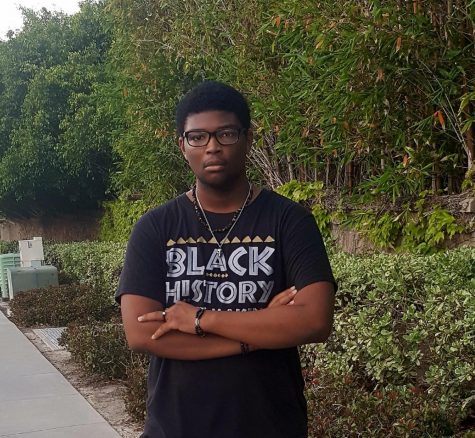
Dorsey-McQueen was shocked by the comment that his school classmates made toward him. It seemed so simple for them to say and it was a comical affair for them. He is scarred from this event: experiencing such an ignorant comment so early in his life made him believe that this was all school would be.
Now Dorsey-McQueen receives dirty looks when he goes for runs with his brother just because their skin happens to be a few shades darker than the so-called “normal.” He realizes that racism may not be as extreme as it has been in the past, yet it has morphed into different forms. Dorsey-McQueen has started to empower himself as a black man by reading novels such as The New Jim Crow which is written by African-American author Michelle Alexander.
He further empowered himself by joining Sage Creek’s campus club BSU (Black Student Union). In this atmosphere, he is able to express personal situations that make others feel uncomfortable. He is able to learn about the black community and encourage himself to take a stand. He believes that being able to join this program has helped him feel more accepted, especially since he attends a predominantly white school in a predominantly white city. He feels that when someone is encountering racism to “use it as some sort of fuel to move forward.”
Destini Perkins
Senior Destini Perkins grew up in Carlsbad and two summers ago spent the majority of her time going on job interviews. She was a good student and was willing to work hard; there seemed to be no reason for her to be turned down one after the other. This is the moment she realized that her curly hair was not the “silk pressed” straight hair that most businesses wanted. This is the moment she realized the color of her skin was the reason she was being denied so often.
“Racism STILL exists,” Perkins said.
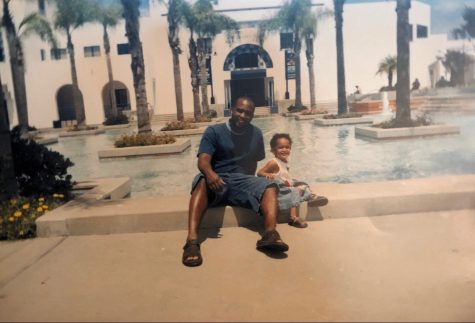
The Arbery shooting left her in a mundane state. There was no shock because an event like this didn’t need one: It was as common as the evening news. The only difference in this case was that the shooters were still on the loose, and it seemed like the entire world was paying attention. Social media was spammed with posts with the overall message that Ahmaud Arbery deserves justice. Soon after Arbery’s shooters were charged with murder, the youth generation was expressing a certain level of acknowledgment and enlightenment to the current events surrounding racism. A spotlight had been shown on the injustices, which brought an overwhelming amount of joy to Perkins.
At three years old, Perkins knew what the word “racism” meant. The definition was the weird looks she would receive in public. From this point, she knew she was a minority but it became more apparent as soon as she arrived at her high school years. She knew that at this point she could no longer be herself without receiving comments from her peers like “you must like hot Cheetos and wear hoops right? Because it’s the ratchet black girl starter pack.” and “Is your dad in Africa?” Comments like these empowered Perkins to join BSU as a sophomore and has increased her passion for becoming a race ambassador. She now resides as BSU’s president and educates others on the beautiful color of their skin. But Perkins always has a phrase that her father once told her in the back of her mind.
“You have to work twice as hard to get half of what they have.”

